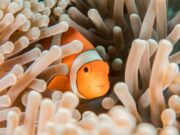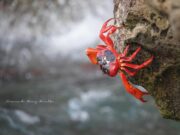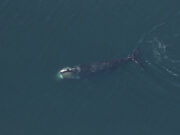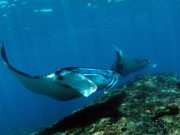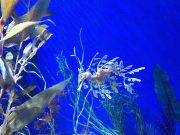The octopus is believed to be the most intelligent of all invertebrates. As well as its relatively large brain, each of the octopus’ eight arms has its own rudimentary intelligence. This allows the arms to function independently. Researchers think that the octopus evolved intelligence to help it hunt and elude predators.
In the wild, octopuses collect and manipulate objects. For example, octopuses have been observed arranging stones around the entrance to their dens. One octopus was captured on video using two coconut hulls as a makeshift suit of armour, holding the shells around itself and rolling along on the sea-floor like a ball. This has been construed as evidence of tool use.
All octopuses can imitate their environment. The mimic octopus can also imitate other sea creatures, such as the predatory sea snake or a fish-eating sea anemone; this helps deter predators and also allows the octopus to get close to its own prey by mimicking a less dangerous creature.
Laboratory experiment reveals that octopuses can recognise different patterns, open jars, and containers, and can solve fairly complex puzzles. One puzzle involved three transparent boxes that could be locked with a simple catch. Food was placed in the smallest box this was then placed inside another box, which was then shut inside the third box Some octopuses were able to unlock, open and remove the boxes until they obtained the crab.
In another experiment, octopuses were able to remove the lids of childproof pill-bottles containing food items; one octopus was later observed playing with an empty bottle, moving it around her tank with jets of water.
Octopuses are also reported to recognise individual humans, choosing to “shake hands” with preferred individuals while squirting ink or water at others.
About the author
Maggie Martin is completing her PhD in Cell Biology, works as a lab tech for Mybiosource.com and administered ELISA kits in the diagnosis and treatment of various diseases. She contributes content on Biotech, Life Sciences, and Viral Outbreaks. Follow on Twitter @MaggieBiosource.

